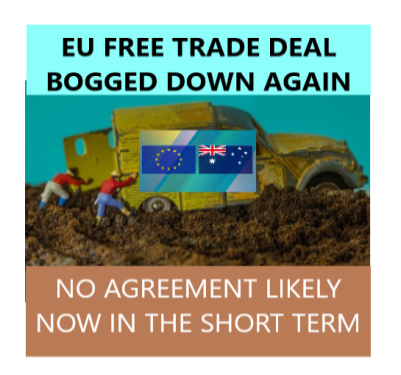Negotiations for a Free Trade Agreement (FTA) between the European Union and Australia have once again collapsed, with Australian government ministers saying a deal is now unlikely in this term of parliament. Technically, we have not closed the door to further talks, but officials believe it is now getting too close to next year’s EU elections for a deal to be possible in the short term.
The Australian trade minister, Don Farrell, held talks with EU representatives on the sidelines of the G7 ministerial meeting in Osaka, Japan, on Sunday, but announced afterwards that they had made no progress.
Negotiation have been going on for five years already. Australia had said it would only do a deal if it was in the national interest, with one of its key demands being to secure much greater access for Australia’s agricultural exporters to sell to EU consumers.
Australia and the EU each accused the other of being unwilling to compromise. The Australian agriculture minister, Murray Watt, said the EU had not offered enough access for beef, sheep, dairy and sugar exporters. Mr Watt said it was ‘a shame’ that a deal could not be reached, adding that Australia had been prepared to make some concessions, but once again, the EU isn’t budging.
The EU has come back now with essentially the same offer it put forward three months ago with a couple of tweaks, Mr Watt told the ABC’s Radio National on this morning (Monday 30 October 2023). “In future, it may be that we can resume negotiations, but I think that will be some time away,” he said.
“The EU elections will be next year. I can’t see them being in a position to resume negotiations before that. We’ve made clear to them that we think it’s unlikely to occur within this current term of the Australian parliament as well.”
The EU offer on geographical indicators would have been too restrictive. As part of the deal, the EU is demanding Australia give up rights to use terms for hundreds of products including parmesan, mozzarella, feta and prosecco, which are considered by the Europeans to be geographical indications. Dairy Australia has estimated the loss of these names would cost the industry about $95 million and would take years to rebrand and re-label and re-educate consumers.
As we wrote in our article back in July, the real sticking point is the European Union’s protectionism. The EU, which heavily subsidises its agricultural sectors, is resisting opening up its markets to Australian producers at a level Australia says is commercially meaningful.
Both sides agree an FTA would have helped diversify away from China, which has used economic coercion against Australia since 2020. In exchange for greater market access, an agreement could see the EU gain easier access to Australia’s vast resource of critical minerals, required for Europe’s green energy transition.
Australian negotiators are also mulling EU demands to scrap the contentious Luxury Car Tax, which has long been a bugbear of European manufacturers because no other imported luxury goods are subject to a similar levy.
An FTA would provide Australian exporters with a competitive edge and would give Australian businesses access to a larger export market in the EU. Australian consumers and companies stand to benefit from a free trade deal with the EU through greater access to goods and services at lower prices.
International trade creates jobs, with one in five Australian workers, or 2.2 million people employed in a trade-related activity; of which 1.57 million work in connection with exports and 671,000 with imports.
For more information about international trade and shipping – whether with Europe or elsewhere around the globe – contact us here at Colless Young. As licensed Customs Brokers and International Freight Forwarders we offer correct, professional advice on all your import and export transactions. We are based in Brisbane and provide a complete range of logistics services, for both airfreight and sea cargo through all Australian ports and airports.

